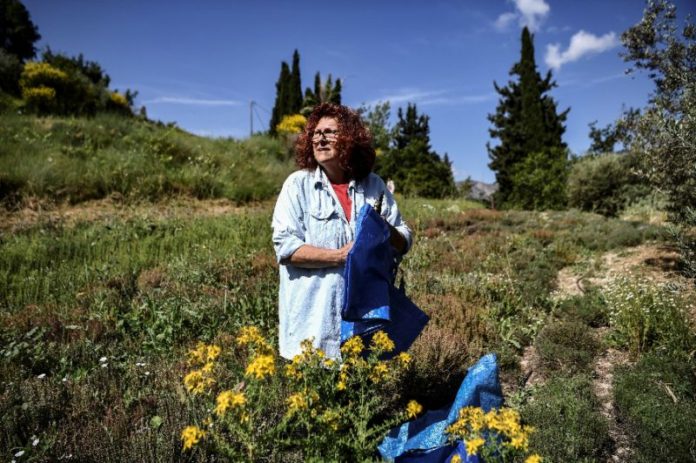DERVNI, Greece, June 22, 2019 (BSS/AFP) – High on the cliff-
tops overlooking the Gulf of Corinth, Areti Zaharopoulou has
managed to scrape together a modest living for the past six years
growing herbs such as sage, thyme and rosemary.
The mother-of-four was an accountant in Athens when she
suddenly found herself out of a job in 2013 at the age of 57, when
the company she had been working for decided to downsize.
So, like thousands of other Greeks, and with 10 years still
to go before she would be entitled to draw a pension, Zaharopoulou
felt compelled to roll up her sleeves and re-train in agriculture.
She took a course in botany, quit Athens in 2014 and found an
abandoned field in Pyrgos on the Pelopponese peninsula, which she
leased to grow aromatic herbs.
“I’m a typical example of the crisis,” she says.
While she says she is fulfilling a long-cherished dream, she
only makes just enough to get by — saving on distribution costs
by doing it herself.
But Zaharopoulou grits her teeth and tries to keep smiling.
“Like everyone who works the fields, I hope I’ll be able to
survive this difficult period,” she says.
Nevertheless, with three weeks to go before the Greek
elections, there is no doubt in her mind as to who is to blame for
the economic torpor still gripping the country, years after the
financial crisis that nearly saw Greece crash out of the eurozone
— the political classes.
– ‘It’s our fault’ –
Yannis Nissotakis, a former banker who now owns a small cafe-
bar in the coastal village of Derveni, agrees.
“There’s no hope in Greece and it’s our fault,” he says.
With nepotism still deeply ingrained in the Greek political
system, “nothing is going to change,” he complains.
Nissotakis used to work for Societe Generale in Athens before
the French bank shut up shop in Greece at the start of the crisis
in 2010.
For the next two years, he worked in a Greek bank, but then
decided to throw in the towel and come to Derveni to open his
cafe-bar.
“Nobody wants to work in the fields. Lemons from Argentina
cost only a euro per kilogramme. That destroys the competition,”
he says.
Even though the Greek economy has shown a timid recovery
since 2017, 23 percent of the population still lives in poverty.
“What has happened in Europe over several decades has been
brutal in Greece in recent years — private debt has increased and
part-time work has risen to 27 percent from five percent before
the crisis,” said Ioannis Kouzis, professor of Social Policy at
the University Pantion of Athens.
“The closure of 270,000 small and medium-sized enterprises
after 2010, the drastic restriction of the liberal professions and
the reduction of income have plunged the country into a stagnation
that creates new classes of poor,” he said.
Public disaffection has become widespread. And in local
elections at the beginning of June, nearly 60 percent of voters
stayed away from the polls in some regions.
For Kouzis, Greece is “caught in a Catch-22,” because its
massive debt mountain leaves no room for manoeuvre for
policymakers to draw up “a new model of production.”
“This leads to a climate of resignation and fatalism in
society, which could, in turn, lead to a new crisis,” the academic
warns.



